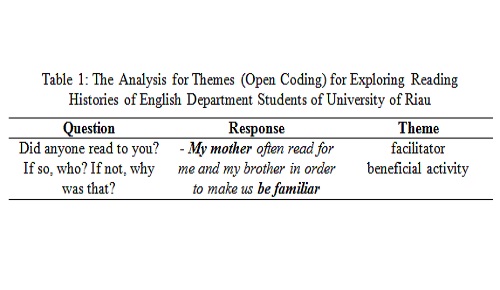
Personal Reading Histories for Personal Reading Interest
Abstract
Keywords
Full Text:
PDFReferences
Anderson, J. N, & Nunan, D. (2008). Practical English Language; Reading (1ed.). New York. McGraw-Hill ESL/ELT.
Ayu, S., Makhdalena, & Sumarno. (2020). Effect of Family Environment and Education Costs on Students’ Achievement with Interest in Reading as Intervening Variable. Journal of Educational Sciences, 4 (1), 164-175
Benard, R.H. & Ryan, W.G. (2010). Analyzing Qualitative Data; Systematic Approach 1ed.). California. SAGE Publication, Inc.
Bergbauer, A., & Staden, S. V. (2018). Social interaction determinants of south African reading literacy achievement: Evidence from prePIRLS 2011. International Journal of Instruction. 11 (2), 1308-1470.
Bumford, J., & Day, R. R. (1998). Extensive reading activities in the second language classroom (1st ed.). UK. Cambridge University Press.
Bumford, J., & Day, R. R. (2004). Extensive reading activities for teaching language (1ed.). UK. Cambridge University Press.
Brown, H. D. (2001). Teaching by Principles an Interactive Approach to Language /Pedagogy (3rd ed.), New York. Pearson Education Inc.
Creswell, W. J. (2014). Research Design. United States of America, SAGE.
Davidson, K. (2010). The integration of cognitive and sociocultural theories of literacy development: Why? How?.The Alberta Journal of Educational Research. 56( 3), 246-256.
Delfi, S., &Yamat, H. (2017). Extensive reading in developing language Competency for Indonesian EFL Learners Majoring in English. IJELTAL, 2(1), 153-164.
Delfi, S., &Yamat, H. (2017). An Analysis of reading performances of Indonesian EFL Learners for Extensive reading practice. Journal of Educational Sciences, 1(1), 35-44
Delfi, S., (2017). Reading experiences on the personal exploration of reading histories of students of FKIP Universtas Riau. Atlantis Press, ASSEHR. 10, 173-178
Delfi, S., Diah. S. F. & Jismulatif. (2017). An Analysis of Exploring Personal Reading Histories for Learners of FKIP University of Riau, Proceedings – ICES, 363-369.
Delfi, S., Diah. S. F. & Jismulatif. (2018). Exploring personal reading histories in developing reading interest of English Study Program learners of University of Riau. IJELTAL, 2(2), 35-44
Delfi, S., Diah. S. F,.& Maria S. (2018). Sociocultural Perspectives in Exploring Personal Reading Histories for Learners of English Study Program learners of University of Riau. Proceeding – 2nd UR-ICES, 353-361
Delfi, S., Diah. S. F,.& Maria S. (2019). Reading Experiences on Exploring personal reading histories in developing reading of English Study Program learners of University of Riau. JES, 3(3), 303-317
Delfi, S., Diah. S. F. & Jismulatif. (2019). An Analysis of Learners’ Reading Experiences Developing Reading Interest Proceedings – SS9 &UR-ICES, 701-709
Erwiza, Kartikowati, S., Gimin, (2019) Factors Affecting the Concentration of Learning and
Social Thinking on Students’ Learning Achievement in Economic Subject. Journal of Educational Sciences, 3(2), 205-215
Istiqomah, Suwondo, & Firdaus, L. N (2020). Environmental Education in Formal Attitudes of Environmental Care for Students. Journal of Educational Sciences, 4(1), 164-175
Junita, D., Suarman, S., & Kartikowati, S. (2018). Accomplishment motivation and soft skill related to learning achievement. Journal of Educational Sciences, 2(2), 83-89
Jung, S., Choi, N., & Jung, S. (2020) The Effect of the First Reading Experience on Reading and Academic Achievement of Elementary First Graders. Ilkogretim online 19(2) 415-425 / ilkogretim online. org.tr
Kamaruddin, K., & Ahmal, A. (2018). The study of history based on local antiquity: A case study of existence of Kampar River in Analyzing the past Maritime in teaching history. Journal of Educational Sciences, 2(1), 72 -82
Kao, P. (2010). Examining Second Language Learning Taking a Sociocultural Stance. RECLS 7, 113-131
Lightbown, P. M., & Spada, N. (2013). How Languages are Learned 4th edition-Oxford Handbooks for Language Teachers. Oxford University Pres McLeod, S. (2007). Lev V Vygotsky.
Nwabudike, C. E., & Anaso, G. (2013). The Effects of Extensive Reading on Some
ESLLearners’ Vocabulary Development: A Case Study of Nigerian- TurkishInternational Colleges, Kano. International Journal of Humanities and Social Science Invention, 24), 34-42.
Nor, M. N., & Rashid, A., R. (2018). A review of theoretical perspectives on language learning acquisition. Kasetsart Journal of Social Sciences. 39, 161-167.
Parkaew, K. & Fongpaiboon, A., (2018). Effects of Extensive Reading on Thai Tertiary St. students’ Reading Attitudes, Arab World English Journal 9 (1), 207-219
Reza, Ghafar S. & Mahmood, Dehqan. (2013). Sociocultural Theory and Reading Comprehension: The Scaffolding of Readers in an EFL Context. International Journal of Research Studies in Language Learning 2 (3), 67-80.
Rong, Ng, Q, Renandya, A., W. & Chong, C., Y., M. ( 2019) Extensive Reading: Theory, Research, and Implementation. TEFLIN 30(2), 171-186
Shabani, K. (2016). Applications of Vygotsky’s sociocultural approach for teachers’ Professional development. Cogent Education, 3, 1-10Salem, A. A. M. S. (2017). Scaffolding Reading Comprehension Skills. English Language Teaching, 10(1), 1916-4750.
Shih, P., Velan, G. R. & Shulruf. B. (2017). Shared values and socio-cultural norms: E-learning technologies from a social practice perspective. Issues in Educational Research. 27 (3), 550-556.
Porkaew, K. & Fongpaiboo, A. (2018). Effects of Extensive Reading on Thai Tertiary Students’ Reading Attitudes University Students. Arab World English Journal, 9 (1) 207-219.
Yarnefi, Y., Kartikowati, S., & Gimin, G. (2019) Interest and Factors Affecting Students in Choosing Social Department, Journal of Educational Sciences, 3(2), 227-236
Yazan. B. (2015). Three Approaches to Case Study in Education: Yin, Merriam, and Stake. The Qualitative Report, 20(2), 134-152.
Zhang, Q. (2015). Emergent Literacy as Sociocultural Practice: How Well Do New Zealand Parents Fit with Ta Whariki?.Journal of Childhood Literacy, 17 (1), 1-23.
DOI: http://dx.doi.org/10.31258/jes.4.3.p.694-704
Refbacks
- There are currently no refbacks.
Copyright (c) 2020 Syofia Delfi, Jismulatif Jismulatif, Fangiana Safitri Diah

This work is licensed under a Creative Commons Attribution 4.0 International License.
Publisher: FKIP Universitas Riau












